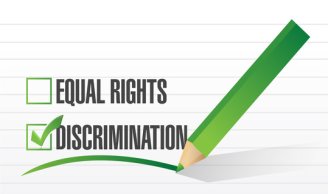Legal Practice Areas
Omaha Discrimination Attorney

While many employees experience a smooth day on the job, there are many people who do not. There are many people who experience discrimination in the workplace on a daily basis, and sometimes it isn’t seen or experienced by others.
Discrimination in the workplace can be experienced in a variety of ways. While most people are familiar with overt discrimination such as someone making loud racial slurs, extreme pay differences for the same work performed, and promotions made unavailable to obviously qualified individuals, discrimination can also include a subtle situation when someone of a protected class is treated differently than that person’s peers.
For example, if a position opens up and the person most qualified for the position is repeatedly denied, and they are included in a protected group, they may have a case for discrimination.
Or, if a company interviews people and refuses to hire the most qualified candidate because they belong to a protected class, this can be grounds for a discrimination lawsuit as well.
Types of discrimination include (but are not limited to):
- Gender discrimination
- Age discrimination
- Race discrimination
- Pregnancy discrimination
- Disability discrimination
- Religious discrimination
- Equal pay discrimination
- National origin discrimination
- Sexual orientation discrimination
Proving discrimination
While you may know for sure you’re experiencing discrimination, you need to know if you have a valid case to file, whether you file with the EEOC or contact a lawyer to handle the case for you.
If you’re going to hire a lawyer to pursue your case on your behalf, there are two types of evidence you can use to prove your case, and they are direct evidence and circumstantial evidence.
It goes without saying that direct evidence is the best way to show that discrimination has taken place. Direct evidence is hard to dispute.
Examples of direct evidence can include statements said (or written) to you by your supervisor, owner, or manager that are in clear violation of your protected status. For example, if your boss tells you that you are being let go because of your disability, and that disability does not affect your ability to perform your job duties, this is direct evidence that your disability was the cause of your (wrongful) termination.
Circumstantial evidence is more indirect, but when there is enough circumstantial evidence to establish a clear pattern, it may be enough to help support your case.
However, circumstantial evidence is not likely to be good enough on its own to prove your case, so you will want to gather as much direct evidence as possible.
There are different types of discrimination claims you can bring, and these include:
Discriminatory Intent/Treatment
In this case, an employee is treated worse than his/her peers directly due to being a member of a protected class/category
Disparate Impact
This type of discrimination claim covers the effect or an employment policy, rather than the intention of such a policy. For example, there could be a policy in effect that all applicants must be able to lift a minimum of 100 pounds, which might rule out some female job applicants.
Retaliation
A retaliation claim is when an employee is retaliated against for engaging in behavior the law protects. For example, if an employee reports a safety hazard and is retaliated against by being demoted, or being suspended, they have a retaliation claim.
If you believe that you have been, or are being discriminated against by your current employer (or potential employer if you are going through the application process and have not yet been hired), contact an experienced employment law attorney to go over your options as soon as possible.
What Our Clients Say

Helped me to choose which course would be best!
From day 1 Frank was able to give me several different options and helped me to choose which course would be best for me in my family law case. Everything was done quickly and without problem. I walked away from court and what seemed like a never ending battle completely satisfied with the outcome. I would recommend Frank and his firm to anyone looking for an attorney who really knows their stuff and cares about their clients.
Grace

